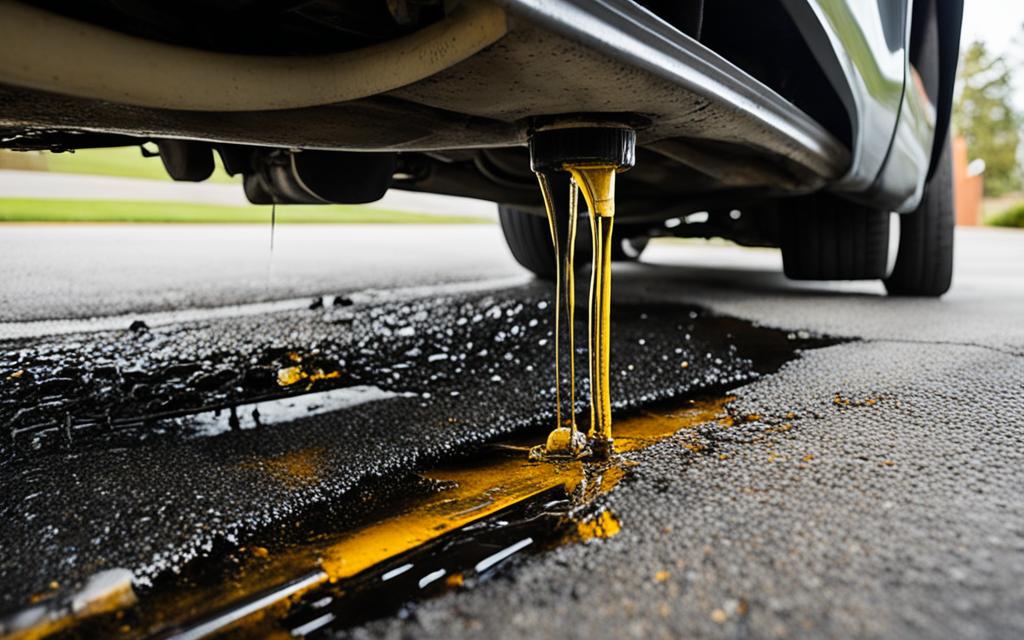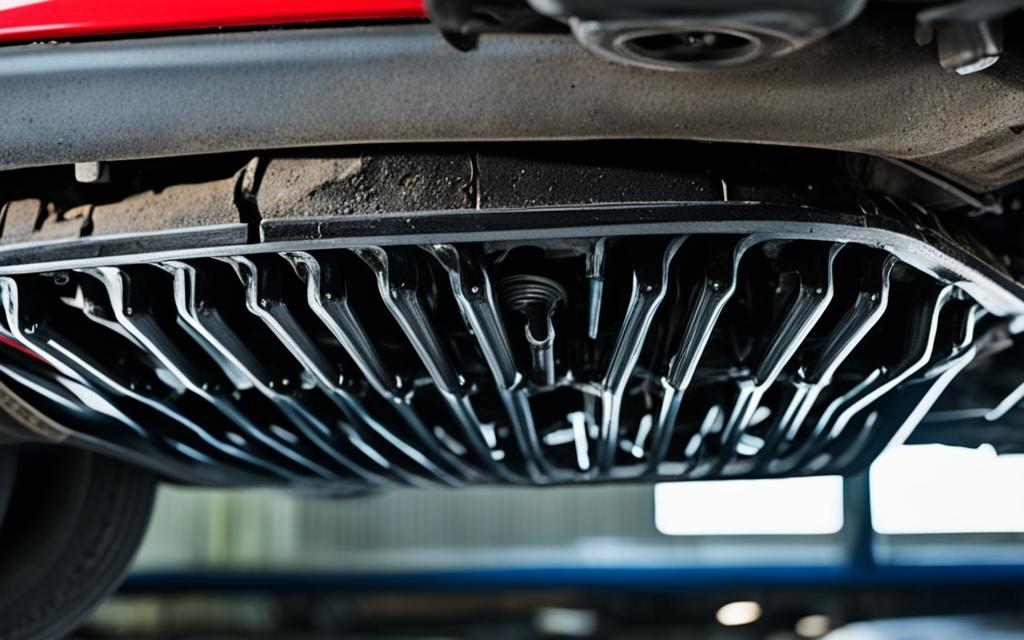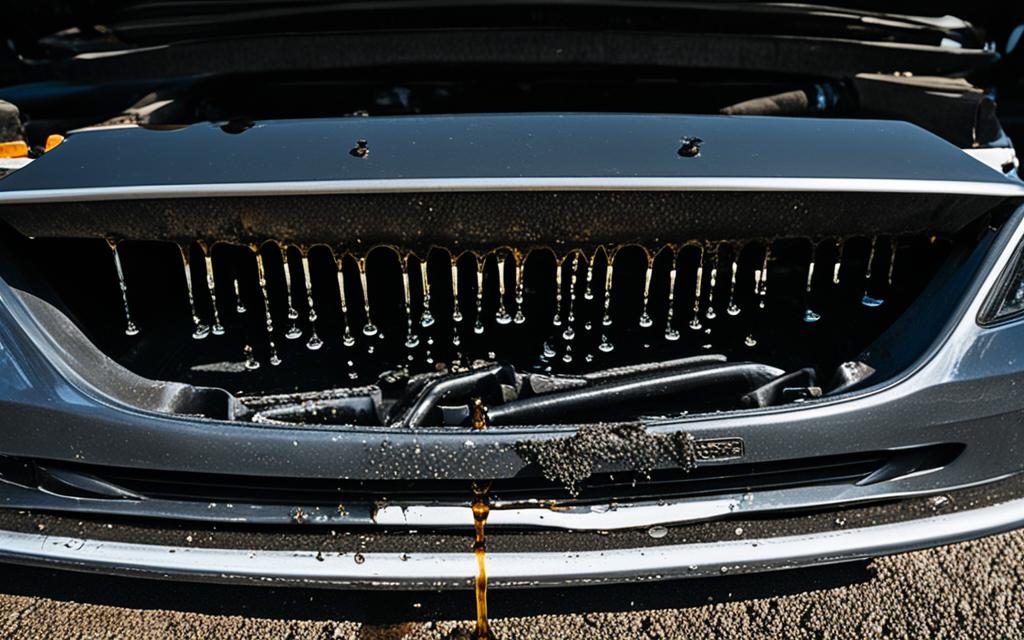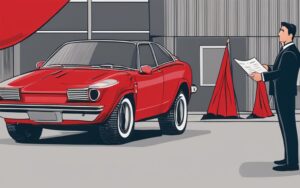Are you experiencing the frustrating problem of your car leaking oil when parked? Oil leaks can lead to costly repairs and potential damage to your vehicle. But don’t worry, we’re here to help! In this article, we will explore the causes of oil leaks when your car is stationary and provide you with quick and effective fixes to address the issue.
Key Takeaways:
- Discover the common causes of oil leaks when your car is parked.
- Learn step-by-step instructions on how to fix an oil leak when not driving.
- Understand the importance of diagnosing oil leaks and identifying their source.
- Explore the common culprits behind oil leaks in parked cars.
- Know when to seek professional advice for oil leaks that persist.
Understanding the Causes of Oil Leak When Car is Stationary
When you notice your car leaking oil while parked, it can be both concerning and frustrating. Understanding the causes behind this issue is essential for finding the appropriate solution. In this section, we will explore the common reasons why a car may leak oil when parked, including issues with seals, gaskets, and oil filters.
Common Causes of Oil Leak When Car is Stationary
1. Faulty Seals: Oil seals play a crucial role in preventing oil from leaking out of various components in the engine. Over time, seals can deteriorate or become damaged, leading to oil leaks when the car is not in use.
2. Worn Gaskets: Gaskets act as a seal between different engine parts, ensuring that oil stays contained within the system. Over time, gaskets can wear out or become brittle, resulting in oil leaks.
3. Damaged Oil Filters: Oil filters are responsible for removing contaminants from the engine oil. If the oil filter becomes damaged or clogged, it can cause a buildup of pressure within the oil system, leading to leaks when the car is parked.
Quote:
“It is important to remember that even a small oil leak can lead to significant engine damage if left untreated. Regular inspection and maintenance are key to preventing further issues.” – John Smith, Certified Mechanic
Now that we’ve explored the main causes of oil leaks when the car is stationary, let’s move on to the next section, where we will learn how to fix these leaks when the vehicle is not being driven.
How to Fix Car Oil Leak When Not Driving
If you’ve noticed an oil leak from your car when it’s parked, it’s important to take action to prevent further damage to your vehicle and avoid any potential safety hazards. In this section, we’ll provide you with step-by-step instructions on how to fix an oil leak when your car is not being driven. Whether you’re a seasoned DIY enthusiast or a beginner, these tips will help you stop the car from leaking oil when parked and keep your vehicle in top shape.
1. Check the Oil Level
The first step in fixing an oil leak is to check the oil level in your car’s engine. A low oil level can lead to increased friction and put additional stress on various engine components, potentially causing leaks. Follow these steps to check the oil level:
- Locate the dipstick under the hood of your car.
- Remove the dipstick, wipe it clean with a cloth, and reinsert it.
- Remove the dipstick again and check the oil level. The oil should be between the two markers on the dipstick.
- If the oil level is low, add the recommended type and amount of oil as specified in your car’s manual.
2. Inspect for Visible Leaks
Next, visually inspect your car’s engine for any visible signs of oil leaks. Look for wet spots, drips, or puddles of oil underneath the vehicle or on the engine components. Pay close attention to areas around the oil pan, valve covers, gaskets, and seals. If you spot a leak, it’s essential to identify its source before proceeding with the repair.
3. Replace Faulty Seals or Gaskets
If you’ve identified a specific seal or gasket as the source of the oil leak, you may need to replace it. Faulty seals and gaskets can cause oil to seep out and create leaks. Consult your car’s manual or seek guidance from a trusted mechanic to determine the correct replacement parts and follow the manufacturer’s instructions for installation.
4. Use Leak-Stop Products
In some cases, using leak-stop products can temporarily fix minor oil leaks. These products are designed to swell and expand seals, minimizing or stopping the flow of oil. However, they are not a permanent solution and may not work for severe leaks. Follow the product instructions carefully when applying the leak-stop formula to your engine.
Pro Tip: Although leak-stop products may provide a temporary fix, it’s important to address the underlying cause of the oil leak for a long-term solution.
If you follow these steps and the oil leak persists, it’s recommended to consult a certified mechanic for further inspection and repair. They have the expertise and diagnostic tools to identify more complex issues that may require professional attention.
Remember, timely action is crucial when dealing with oil leaks. Addressing the issue promptly can help you prevent costly engine damage and ensure the safety and performance of your vehicle. Stay vigilant and keep up with regular maintenance to keep your car running smoothly and leak-free.
Diagnosing Oil Leak When Vehicle is Stationary
When your vehicle is parked and you notice oil pooling underneath, it’s important to diagnose the source of the leak and address it promptly. Ignoring an oil leak can lead to further damage and potential safety hazards. In this section, we will guide you through the process of diagnosing an oil leak when your vehicle is stationary.
Why Diagnosing an Oil Leak is Important
Identifying the source of an oil leak is the first step in resolving the issue. It allows you to determine the severity of the problem and the appropriate course of action. Diagnosing the leak will help you understand whether it’s a minor issue that can be fixed with simple maintenance or if it requires the expertise of a professional mechanic.
Signs of a Potential Oil Leak
There are a few signs that can indicate a potential oil leak when your vehicle is parked:
- Oil stains: Look for dark, greasy stains on the ground where your car is parked.
- Burning smell: If you notice a strong burning smell coming from your vehicle, it could be a sign of an oil leak.
- Low oil level: Regularly check your vehicle’s oil level using the dipstick. A sudden drop in oil level may indicate a leak.
By paying attention to these signs, you can catch an oil leak early and prevent further damage to your vehicle.
Diagnosing the Oil Leak
To diagnose an oil leak, follow these steps:
- Inspect the engine bay: Look for any visible signs of oil leakage, such as damp spots or oil drips.
- Check under the vehicle: Use a flashlight to inspect the underside of your vehicle for any oil stains or leaks.
- Examine the oil filter and drain plug: Inspect these components for signs of leakage or loose connections.
If you are unable to locate the source of the leak or if you’re unsure about the severity of the problem, it’s recommended to consult a professional mechanic. They have the expertise and diagnostic tools to accurately identify and resolve oil leaks.
“Diagnosing an oil leak in a stationary vehicle is crucial in preventing further damage and ensuring the safety of your vehicle.”
– [Mechanic Name], Certified Auto Technician
It’s important to remember that addressing an oil leak promptly can save you from costly repairs down the road. Regularly inspecting your vehicle for leaks and monitoring the oil level will help you catch and resolve any issues early on.
Common Culprits: Why Does My Car Leak Oil When Not Running?
If you’ve noticed your car leaking oil only when it’s parked, you’re not alone. This common issue can be frustrating and concerning for car owners. There are several possible reasons why your car may be leaking oil when not running, and it’s essential to understand these common culprits to address the problem effectively.
One potential cause of oil leaks when your car is parked is worn-out engine components. Over time, engine parts can become degraded or damaged, leading to oil leaks. Common components that may contribute to oil leaks include gaskets, seals, and O-rings. These parts play a crucial role in keeping the oil contained within the engine, and when they start to wear out, oil can escape and cause leaks.
Another common culprit behind oil leaks in parked cars is a damaged oil pan. The oil pan sits at the bottom of the engine and serves as the reservoir for the engine oil. If the oil pan is cracked, corroded, or has a faulty gasket, it can cause oil to leak when the car is not running. Inspecting the oil pan for any signs of damage or corrosion is essential in identifying and resolving oil leaks.
A faulty valve cover gasket is yet another potential reason why your car may be leaking oil when parked. The valve cover gasket is responsible for sealing the gap between the valve cover and the engine. When this gasket deteriorates or becomes damaged, oil can escape and result in leaks. Checking the condition of the valve cover gasket and replacing it if necessary can help address oil leak issues.
Inspecting these common culprits and resolving any issues can often fix the problem of oil leaks when your car is not running. However, it’s important to note that diagnosing the exact cause of an oil leak can be challenging. If you’re unsure about the source of the leak or if DIY fixes don’t resolve the issue, it’s best to seek assistance from a qualified mechanic.
By addressing oil leaks promptly, you can prevent further damage to your vehicle’s engine and ensure its optimal performance. In the next section, we will discuss when to seek expert advice for oil leaks and the benefits of involving a certified mechanic in resolving the issue.
Professional Help: When to Seek Expert Advice for Oil Leaks
If you’ve tried DIY fixes but your car is still leaking oil only when parked, it’s time to consider seeking professional help. Certified mechanics have the knowledge and experience to diagnose and repair complex oil leaks, ensuring your vehicle stays in optimal condition.
There are certain scenarios in which involving a professional becomes necessary. Here are a few situations where it’s best to seek expert advice:
- Severe oil leaks: If you notice a significant amount of oil pooling underneath your car when it’s parked, it indicates a severe leak that requires immediate attention. A professional mechanic will be able to identify and address the exact source of the leak.
- Persistent leaks: If your car continues to leak oil after attempting DIY fixes, it’s best to consult a professional. They can perform a comprehensive inspection to determine the underlying cause of the persistent leak and provide a lasting solution.
- Unusual noises or smells: If you notice any unusual noises or smells coming from your car’s engine or exhaust system, it could be a sign of a more complex issue causing the oil leak. An expert mechanic will be able to diagnose the problem accurately.
Remember, ignoring an oil leak can lead to further damage to your vehicle’s engine and other components, potentially resulting in costly repairs. Seeking professional help in a timely manner can save you from more significant problems down the road.
Maintaining the Health of Your Vehicle’s Oil System
To prevent future oil leaks, it’s crucial to prioritize regular maintenance for your vehicle’s oil system. By following these tips and guidelines, you can ensure the longevity and efficiency of your engine, keeping it in optimal condition while minimizing the risk of car leaking oil when parked.
1. Schedule Regular Oil Changes
Regularly changing your engine oil is essential for maintaining a healthy oil system. Over time, oil breaks down and loses its lubricating properties, becoming less effective at protecting your engine’s components. Refer to your vehicle’s manual or consult with a trusted mechanic to determine the appropriate oil change intervals for your specific make and model.
2. Use the Right Type of Oil
Choosing the correct type of oil for your vehicle is crucial for its overall performance and longevity. Different engines require different oil viscosities, so it’s essential to use the oil recommended by the manufacturer. Using the wrong oil can lead to increased friction, poor lubrication, and potential leaks.
3. Inspect for Leaks Regularly
Regularly inspecting your vehicle for oil leaks is a proactive measure that can help you identify issues before they worsen. Park your car on a clean surface and check for any signs of oil pooling or dripping. Pay close attention to the engine compartment, oil pan, and gaskets. If you notice any oil leaks, address them promptly to prevent further damage.
4. Maintain Proper Oil Levels
Keeping your engine’s oil levels within the recommended range is crucial for the optimal functioning of your vehicle. Low oil levels can lead to increased friction and overheating, potentially causing oil leaks. Check your oil levels regularly using the dipstick and top up if necessary, ensuring you do not overfill the oil reservoir.
5. Address Any Maintenance Issues Promptly
If you notice any warning signs of potential oil leaks, such as burning oil smell, smoke, or unusual engine noise, it’s essential to address them promptly. Ignoring these signs can lead to further damage and more severe oil leak issues. Consult with a qualified mechanic to diagnose and resolve any maintenance issues before they escalate.
“Regular maintenance is key to preventing oil leaks and preserving the health of your vehicle’s oil system. By following a proactive approach and addressing any issues promptly, you can enjoy a smoother and more reliable driving experience.”

6. Summary of Maintenance Tips
| Maintenance Tips | Description |
|---|---|
| Schedule Regular Oil Changes | Follow manufacturer guidelines for oil change intervals. |
| Use the Right Type of Oil | Select the appropriate oil viscosity recommended for your vehicle. |
| Inspect for Leaks Regularly | Check for oil leaks in key areas like the engine compartment and oil pan. |
| Maintain Proper Oil Levels | Keep oil levels within the recommended range. |
| Address Any Maintenance Issues Promptly | Take action if you notice warning signs of potential oil leaks. |
Oil Leak Prevention: Tips for Parking Your Car
Properly parking your car can significantly reduce the chances of oil leaks when it’s parked. By following these practical tips, you can minimize the risk of oil leaks and maintain a cleaner driveway:
- Avoid Parking on Slopes: When choosing a parking spot, try to avoid parking your car on steep slopes. Parking on an incline can cause the oil to flow to one side of the engine, potentially leading to leaks. Instead, opt for level ground whenever possible.
- Use Wheel Chocks: Placing wheel chocks in front and behind the wheels of your parked car can help prevent any accidental rolling that may put unnecessary stress on the oil system. This is especially important if you frequently park on inclined surfaces.
- Position the Car Correctly: When parking, ensure that your car is aligned properly within the parking space. Avoid hitting objects such as curbs or parking blocks, which can damage the undercarriage and potentially cause oil leaks.
- Inspect for Oil Leaks: Regularly check your parked car for any signs of oil leaks or drips. Look for puddles or stains on the ground beneath the car, as well as any visible spots or wetness around the engine area. Early detection can help you address the issue promptly.
By implementing these preventive measures, you can significantly reduce the chances of experiencing oil leaks when your car is parked.
| Parking Tips to Prevent Oil Leaks | Description |
|---|---|
| Avoid Parking on Slopes | Parking on slopes can cause oil to flow to one side, potentially leading to leaks. |
| Use Wheel Chocks | Placing wheel chocks helps prevent accidental rolling, reducing stress on the oil system. |
| Position the Car Correctly | Align the car properly within the parking space to avoid hitting objects that may cause damage and leaks. |
| Inspect for Oil Leaks | Regularly check for signs of oil leaks, such as puddles or stains, to address them promptly. |
Cleaning Up Oil Leaks: Removing Stains and Residue
Oil leaks on your driveway or in your garage can be an eyesore, but with the right techniques, you can effectively clean up oil stains and residue. Follow these tips to keep your parking area clean and presentable.
1. Act Quickly
As soon as you notice an oil leak, it’s essential to act quickly to prevent the stain from setting in. The longer the oil sits, the harder it becomes to remove. Grab some absorbent materials like kitty litter, sawdust, or newspaper and spread them over the fresh oil spill. These materials will help to soak up the oil and minimize the spread of the stain.
2. Remove Excess Oil
Once the absorbent materials have had time to soak up the oil, it’s time to remove the excess. Use a broom or a dustpan to sweep up the absorbent materials, making sure to collect all the oil-soaked material. Dispose of it in a sealed plastic bag or an appropriate waste container.
3. Pre-Treat the Stain
Before tackling the oil stain directly, apply a pre-treatment solution to help break down the oil. There are specific commercial oil stain removers available, but if you prefer a DIY approach, you can create a mixture of dish soap and hot water. Apply the solution to the stain and let it sit for at least 30 minutes to allow it to penetrate and loosen the oil.
4. Scrub the Stain
After the pre-treatment has had time to work, use a scrub brush or a stiff-bristle broom to scrub the oil stain vigorously. Focus on the affected area and use circular motions to lift the oil from the surface. For stubborn stains, you may need to repeat this step or use a pressure washer for more significant cleaning power.
5. Rinse and Repeat
Once you have finished scrubbing, rinse the area thoroughly with water to remove any remaining cleaning solution and oil residue. Use a hose or a bucket of clean water to wash away the debris. If necessary, repeat the pre-treatment and scrubbing steps until the oil stain is no longer visible.
| Materials Needed: | Steps: |
|---|---|
| – Absorbent materials (kitty litter, sawdust, or newspaper) | 1. Act quickly to prevent the stain from setting in. |
| – Broom or dustpan | 2. Remove excess oil by sweeping up absorbent materials. |
| – Pre-treatment solution (commercial oil stain remover or dish soap and hot water mixture) | 3. Apply a pre-treatment solution to break down the oil. |
| – Scrub brush or stiff-bristle broom | 4. Scrub the oil stain vigorously. |
| – Hose or bucket of clean water | 5. Rinse the area thoroughly to remove residue. |
By following these steps and using the right materials, you can effectively clean up oil stains caused by car leaks when parked. Remember to always dispose of oil-soaked materials properly and adhere to local regulations for waste disposal.

Keep your parking area clean and free from unsightly oil stains with these cleaning tips. Taking prompt action and using the right techniques will ensure a presentable and well-maintained parking space for your vehicle.
Conclusion
In conclusion, addressing oil leaks in your parked car is crucial for maintaining a cleaner driveway and a healthier vehicle. Throughout this article, we’ve explored the causes of oil leaks when the car is stationary and provided quick fixes to resolve the issue.
By understanding the common culprits behind oil leaks and learning how to diagnose and fix them, you can save time and money in costly repairs. Regular maintenance of your vehicle’s oil system, including proper oil changes and inspections, is essential in preventing future leaks.
If you’ve tried the DIY fixes suggested in this article and the oil leak persists, it’s important to seek professional help from a certified mechanic. They have the expertise to accurately diagnose the problem and recommend the appropriate repairs.
Remember, taking proactive steps to prevent oil leaks, such as parking your car correctly and maintaining a clean oil system, will go a long way in preserving the overall health and longevity of your vehicle. Don’t delay in addressing oil leaks, as prompt action can help avoid further damage and keep your driveway oil-free.
FAQ
Why is my car leaking oil when parked?
There could be several reasons for an oil leak when your car is parked, including worn-out seals or gaskets, a cracked oil pan, or a faulty oil filter. It’s important to identify the source of the leak to determine the appropriate solution.
How can I fix an oil leak when my car is not being driven?
Fixing an oil leak when your car is stationary requires identifying the source of the leak and taking appropriate action. Start by checking the oil level and inspecting for visible leaks. If necessary, replace worn-out seals, gaskets, or other faulty components. It’s also advisable to consult a professional mechanic for advanced troubleshooting and repairs.
How can I diagnose an oil leak when my vehicle is stationary?
Diagnosing an oil leak when your vehicle is parked involves inspecting the oil filter, oil pan, valve cover gaskets, and other engine components for signs of leakage. Look for oil spots or stains under your vehicle and pay attention to the oil level. If you’re unsure, it’s best to seek professional assistance.
Why does my car leak oil when it’s not running?
Oil leaks in parked cars can occur due to worn-out engine components, damaged oil pans, or faulty valve cover gaskets. These issues can cause oil to seep out and create puddles or stains under the vehicle. Identifying the specific cause will help in finding the appropriate solution.
When should I seek professional help for oil leaks?
If DIY fixes do not resolve the oil leak issue when your car is parked, it’s best to seek professional help. Certified mechanics have the expertise to diagnose the problem accurately and recommend the appropriate repairs. Continuing to drive a car with an oil leak can lead to more significant damage and costly repairs down the line.
How can I maintain the health of my vehicle’s oil system?
Regular maintenance is crucial for preventing oil leaks. Follow the manufacturer’s guidelines for oil changes and use the recommended oil type. Additionally, inspect the oil system for any visible leaks and address them promptly. Regular maintenance and proactive care will help keep your vehicle’s oil system in good condition.
Are there any tips for parking my car to prevent oil leaks?
Yes, there are several tips to minimize the risk of oil leaks when parking your car. Avoid parking on slopes, as this can put unnecessary stress on the oil system. Use wheel chocks to secure your parked vehicle, especially on inclines. Additionally, make sure the car is properly positioned within the parking spot to reduce strain on the engine components.
How can I clean up oil stains and residue?
To clean up oil stains and residue left by leaks, start by absorbing excess oil with kitty litter or a similar absorbent material. Then, use a degreaser or household cleaner specifically designed for oil stains to treat the affected area. Scrub gently and rinse thoroughly with water. For stubborn stains, you may need to repeat the process or consult a professional cleaning service.








